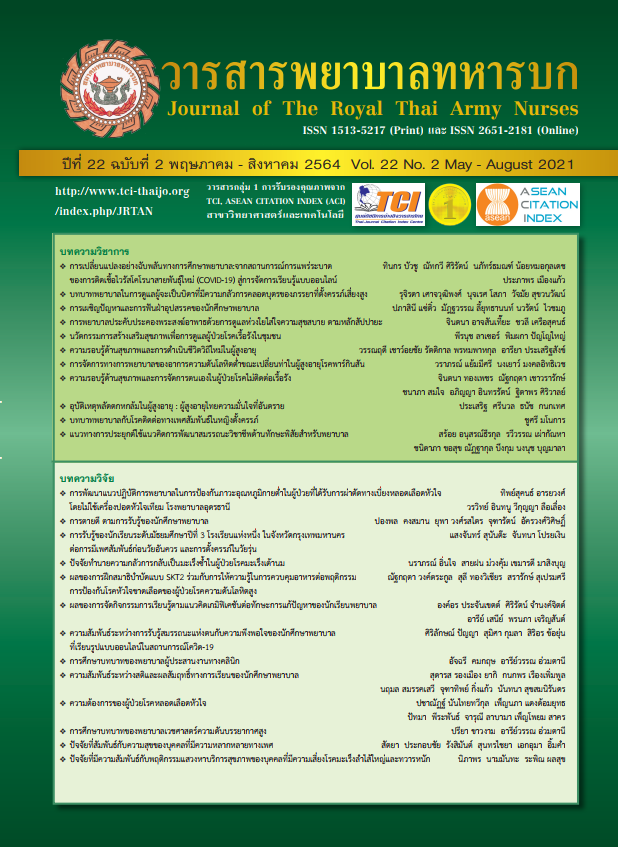The Relationship between Mindfulness and Academic Achievement among Nursing Students
Keywords:
Mindfulness, Academic Achievement, Nursing StudentsAbstract
This descriptive research study examined the level of nursing students’ dispositional mindfulness and its relationship with academic achievement. The participants were 234 first to fourth year nursing students enrolling in the Bachelor of Nursing Science program at a university in Bangkok (n= 59, 57, 58, and 60 respectively). The research instrument was the Thai version of the Five Facet Mindfulness Questionnaire (FFMQ). The reliability of the questionnaire was high (α = .86). The participants’ demographic data and their level of dispositional mindfulness were analyzed using descriptive statistics. In addition, the relationship between the participants’ dispositional mindfulness and academic achievement was analyzed using the Pearson’s ProductMoment Correlation. This study found that both the participants’ overall dispositional mindfulness score and nonreacting to inner experience facet score were moderate; on the other hand, their scores on the observing facet (attending to internal and external experiences), describing facet (labeling experiences with words), and acting with awareness facet (paying full attention to current activity), were found to be moderate to slightly high; while their nonjudging facet score was found to be low to slightly moderate. Furthermore, the relationship between acting with awareness facet and academic achievement was found to be statistically significant positive but weak (r = .19, p < .01). The findings suggested nursing instructors may consider integrating simple Vipassana mindfulness trainings in classrooms throughout the Bachelor of Nursing Science program.
Downloads
References
Phra Prom Khunaporn. Expanded version of buddhadhamma: Buddhadhamma enshrines 26 centuries. 32nded. Bangkok: Pet and Home Publishing; 2012. (in Thai)
Holzel BK, Carmody J, Vangel M, Congleton C, Yerramsetti SM, Gard T, Laza SW. Mindfulness practice leads to increases in regional brain gray matter density. Journal of Psychosomatic Research. 2011; 191(1): 36–43.
Lyons KE, DeLange J. Mindfulness matters in the classroom: The effects of mindfulness training on brain development and behavior in children and adolescents. In: Schonert-Reichl KA, Rebert RW, editors. Handbook of mindfulness in education. New York: Springer; 2016: 271-283.
Kerdsang T, Kerdsang U, Ngamwongwiwat B. Effects of mindfulness-based therapy and counseling program on stress and mindfulness in nursing students. The Journal of Psychiatric Nursing and Mental Health. 2018; 32(1): 33-48. (in Thai)
Chen Y, Yang X, Wang L, Zhang X. A randomized controlled trial of the effects of brief mindfulness meditation on anxiety symptoms and systolic blood pressure in Chinese nursing students. Nurse Education Today. 2013; 33(10): 1166-1172.
Gunook Y, Yuprasert S, Palintorn N, Sirisunthron V. A study of anapanasati bhavana for the development of quality of life toward the nursing students of Ratchathani University. Proceedings of the RTUNC: The 1st National Conference; 2016, July 29: 2315-2313. Ubon Ratchathani, Thailand. (in Thai)
Sriroongrueng W, Buncherd H, Thanapongpicaht S. Effect of mindfulness on self-development in students of prince of Sonkla Univeristy. Parichart Journal. 2018: 34-40. (in Thai)
Thanupaprungsun S, Leardsakornsiri M. Effects of meditation practice integrating Stipathan 4 with SKT1 on nursing students’ brain capacity, self-awareness, and academic achievement. Songklanagarind Journal of Nursing. 2016; 36(supplement): 13-28. (in Thai)
Yeoungsuk S. Depression, stress, anxiety, and mindfulness in nursing students. Korean Journal of Adult Nursing. 2011; 23(4): 394-402.
Rongmuang S. The effect of embodied learning on nursing students’ presence, wellbeing, relationships with patients, and learning experience. (dissertation). San Francisco, California: California Institute of Integral Studies; 2018.
Ksendzov E. Associative relationship among mindfulness, academic grades, and affective outcomes in adolescence. (dissertation). Minneapolis, Minnesota: Walden University; 2016.
Nivenitha P, Nagalakshmi K. Influence of test anxiety and mindfulness on academic performance. The International Journal of Indian Psychology. 2016; 3(4): 34-39.
Teodorczuk K, Guse T, Du Plessis GA. Mindfulness and academic achievement in south African university students. Research Gate 2016. doi: 10.13140/RG.2.1.3307.8169
Chiesa A. The difficulty of defining mindfulness: Current thought and critical issues. Mindfulness 2012. doi:10.1007/s12671-012-0123-4
Baer RA, Smith GT, Hopkins J, Krietemeyer J, Toney L. Using self-report assessment methods to explore facets of mindfulness. Assessment. 2006; 13(1): 27-45.
Rattanaphet S. The relationship among spiritual intelligence, mindfulness, and happiness in Buddhism. (thesis). Bangkok: Srinakharinwirot University; 2015. (in Thai)
Downloads
Published
How to Cite
Issue
Section
License
บทความหรือข้อคิดเห็นใดใดที่ปรากฏในวารสารพยาบาลทหารบกเป็นวรรณกรรมของผู้เขียน ซึ่งบรรณาธิการหรือสมาคมพยาบาลทหารบก ไม่จำเป็นต้องเห็นด้วย
บทความที่ได้รับการตีพิมพ์เป็นลิขสิทธิ์ของวารสารพยาบาลทหารบก
The ideas and opinions expressed in the Journal of The Royal Thai Army Nurses are those of the authors and not necessarily those
of the editor or Royal Thai Army Nurses Association.






